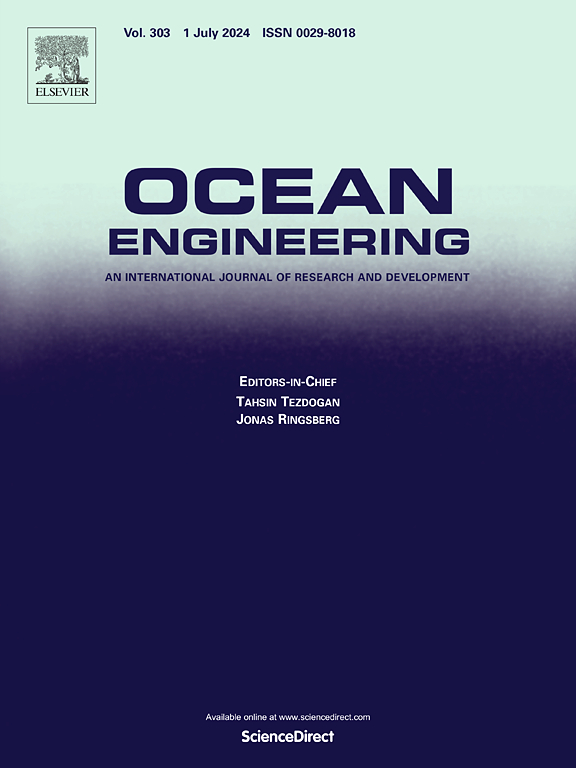Optimal prediction horizon length in model predictive control to maximise energy absorption by a point absorber wave energy converter
IF 5.5
2区 工程技术
Q1 ENGINEERING, CIVIL
引用次数: 0
Abstract
For real-time control in Model Predictive Control (MPC), predicting the future wave exciting force is essential. In MPC formulation, the prediction horizon length assesses how far in advance the prediction of wave exciting force is required. This paper proposes the optimal prediction horizon length in MPC to maximize energy absorption efficiency. The MPC formulation is tested numerically on a point absorber wave energy converter (PA-WEC) in regular waves. Heave oscillation is the only permitted motion of the floating body of the PA-WEC. The responses obtained by MPC are compared with those of the linear damping control. The analysis also indicates how the energy absorption efficiency depends on the prediction horizon length and sampling interval. Three time horizon lines have been investigated following the analysis of the time horizon with respect to frequency. After investigating absorbed power and energy absorption efficiency across three time horizon lines in relation to frequency, an optimal time horizon line is proposed. This line signifies the optimal prediction horizon length in MPC for the PA-WEC, ensuring higher energy absorption power and efficiency.
以点吸收波能转换器最大吸收能量为目的的模型预测控制中的最优预测层长
在模型预测控制(MPC)的实时控制中,对未来波浪激励力的预测是必不可少的。在MPC公式中,预测视界长度是对波浪激振力预测需要提前多远的评价。本文提出了MPC中最优的预测视界长度以最大限度地提高能量吸收效率。在点吸收波能量转换器(PA-WEC)上对MPC公式进行了数值测试。升沉振荡是PA-WEC浮体唯一允许的运动。将MPC控制与线性阻尼控制的响应进行了比较。分析还表明了能量吸收效率与预测层长和采样间隔的关系。在对时间范围与频率的关系进行分析之后,研究了三条时间范围线。在研究了三种时间水平线上的吸收功率和能量吸收效率与频率的关系后,提出了最优时间水平线。该线表示PA-WEC在MPC中的最佳预测水平长度,以确保更高的能量吸收功率和效率。
本文章由计算机程序翻译,如有差异,请以英文原文为准。
求助全文
约1分钟内获得全文
求助全文
来源期刊

Ocean Engineering
工程技术-工程:大洋
CiteScore
7.30
自引率
34.00%
发文量
2379
审稿时长
8.1 months
期刊介绍:
Ocean Engineering provides a medium for the publication of original research and development work in the field of ocean engineering. Ocean Engineering seeks papers in the following topics.
 求助内容:
求助内容: 应助结果提醒方式:
应助结果提醒方式:


